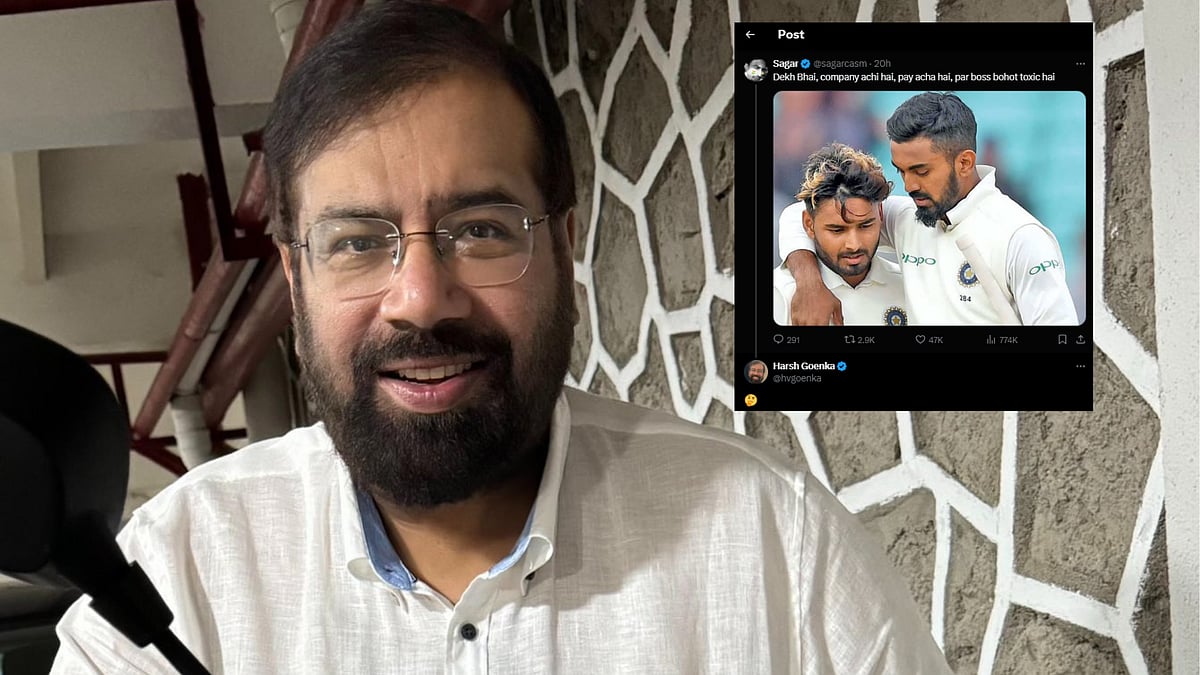The question being discussed now in the corridors of Mantralaya, the headquarters of Maharashtra government in Mumbai, is whether the government of Maharashtra is divided over the latest political issue that has rocked the state, the massive agitation over the demand for reservation for the Maratha community.
This is because one of the senior most ministers in the state cabinet, Chhagan Bhujbal, has now come out openly against some of the state government's decisions about how to take this matter forward, and has demanded that the committee appointed by the state government to study the matter and provide a solution, the Justice Shinde committee, should be dismissed!
The government's own minister making this kind of a demand in public view, in front of the state's media, has shaken the Shinde government; it finds the Maratha agitation to be the biggest political challenge it currently faces. Bhujbal's contention is that originally the demand put forward by the Maratha community leaders was limited to going into research about Marathas from the region of Marathwada which came under the Nizam province previously; and because the Nizam rule was headquartered in Hyderabad all the land records about eligible people being landholders and Kunbis were kept in Hyderabad, which made it difficult for them to get the benefit of reservation in Maharashtra.
Bhujbal now says the research about land records and identifying Kunbi community members should be limited to only the Marathwada region and not be extended to other regions like Konkan, North Maharashtra, Western Maharashtra, or Vidarbha. This is contrary to the decision the state cabinet took some weeks ago of allowing an extension to the Justice Shinde committee and asking them to go into the research of all land records all over the state.
There is sharp division among members of the Maharashtra cabinet on this issue and unfortunately it happens to be clearly on caste lines. Leaders such as Bhujbal who belong to the Other Backward Classes or OBCs on one side while leaders like Minister Shambhuraj Desai, who represent the Maratha community on the other.
Desai came out aggressively against Bhujbal on Monday at a media meet and insisted that the Justice Shinde committee should continue with the study and research that they have been tasked to undertake in all parts of Maharashtra and not just Marathwada region. The government including Chief Minister Eknath Shinde seem very unhappy that Chhagan Bhujbal is repeatedly speaking out in the media and taking on the state cabinet while he himself is part of it!
It is clear that while doing all this, Bhujbal is projecting himself as a prominent leader of the OBC community in Maharashtra which is the largest in the state of Maharashtra. The OBCs have the demographic advantage and Bhujbal is willing to forgo even his party's political backing or any position in the government that he currently holds, because he knows the support of the community and polarisation that would perhaps happen in the coming months will give him a much bigger political plank in the state.
The larger picture of course is that there will surely be clear polarisation on caste lines in the coming months all over Maharashtra. The state is going for elections at all levels. In 2024 the sequence will start with the Lok Sabha polls, then the stage will be set for the Mumbai Municipal Corporation and 14 other city corporation polls including Pune and Navi Mumbai, and towards the end of the year the state Assembly polls will be held as the Assembly term ends by October 2024.
In such an important phase it is very noteworthy that the state will witness extreme polarisation and perhaps even tension in some parts over the caste divide. This also means that all political parties will now look for candidates along caste lines and decide who contests in which constituency, perhaps mainly on the basis of the candidate's caste.
This means that issues related to development, infrastructure, inflation and unemployment are likely to take a back seat in the poll campaign. If there are repeated incidents of tension or violence such as we saw in Beed district of Marathwada some days ago, this would also hamper the new investment climate in the state.
Time and again, Maharashtra has seen political parties, especially regional parties based in the state, taking up only emotional or caste or linguistic issues ahead of important polling season. On Tuesday, in various parts of the state, citizens also saw Raj Thackeray's Maharashtra Navnirman Sena or MNS activists attacking some shops because they don't exhibit Marathi signboards! The deadline given by the state government for putting up mandatory Marathi signboards in Maharashtra ended on Monday.
Parties do not seem to be very concerned about taking up the real issues that people face — unemployment being at a record high percentage, inflation touching skyhigh numbers, pollution in many cities touching unbearable levels and infrastructure such as roads and bridges being in poor state. However they aggressively take up issues along caste and linguistic lines. Alert citizens, social organisations and NGOs will tell you ahead of the polls, “You must come out and cast your vote this time.” The question is whether some political parties will say “You must vote for your caste!”
Rohit Chandavarkar is a senior journalist who has worked for 31 years with various leading newspaper brands and television channels in Mumbai and Pune












